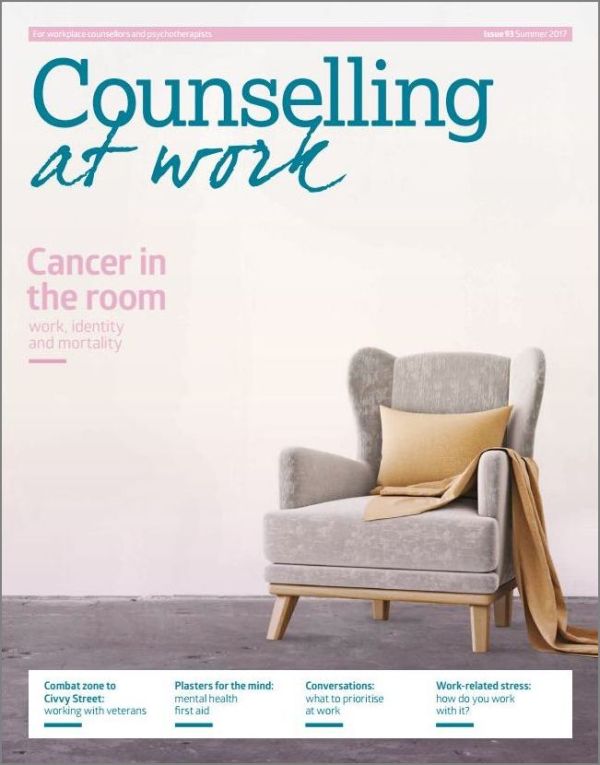In this issue
Features
Cancer in the room (free article)
Caroline Feldon Parsons reflects on her work with clients with cancer
From combat zone to Civvy Street
Alexandra Gillyon talks to therapists about working with veterans
Plasters for the mind
Nicola Banning finds out about the work of Mental Health First Aid (England)
Conversations
Penny Campling and Andrew Kinder discuss their mental health at work priorities
Q&A
The complexities of work-related stress
Regulars
Workplace matters (free article)
Sandi Mann — To err is human; but not at work?
Talking purple (free article)
Sarah Simcoe — Purple networkology
Cyberwork
Sarah Worley-James — Diversity
EAP matters
Amanda Smith — EAP work: is it for you?
Practitioner matters
Patrick Quinn — When your client is dismissed
First words
Whatever conclusions you draw from the result of the 2017 General Election, a significant factor appears to be the public’s opposition to austerity, cuts and pay freezes borne by the public sector since 2010. How often it jars, when I read, yet again, that the UK is the fifth richest country in the world, given what I hear in the counselling room working with those on the frontline of our society.
In the wake of the terrorist atrocities in Manchester and London, and the tragic fire at the Grenfell Tower, a spotlight has been shone on the vital work of our public services; in particular, fire fighters, the police and the health service. Experienced nurse, Joe O’Brien spoke movingly about her night shift immediately after the Manchester bombings: witnessing injuries she’d never seen before; about how the team got on with the job they are trained for; and how, at the end of the shift, she went home and cuddled her dogs.
As the nation becomes more informed about mental health, it seems that the media interest increases in how our first responders cope in the aftermath of traumatic incidents and terrorist attacks. There’s a terrible irony that the same public sector workers subjected to the impact of cuts and pay freezes since the crash, are unfailingly there for us when our society needs them most, picking up the pieces and healing the wounds. If the Government really has woken up to the unacceptability of this, it’s long overdue.
As a community of workplace practitioners, we too are part of this cycle, providing essential emotional and psychological support when stretched employees and their organisations need us. Too often we work in a parallel climate of economic uncertainty and insecurity about the future of our jobs and the services we manage. Against this backdrop, I welcome the nation banging its collective drum recently to increase awareness about mental health. But the voices calling to move beyond awareness and for increased action, and more specifically more resources, are growing louder.
During the General Election campaign, BACP committed to nine policy priorities, one of which was the provision of workplace counselling for all employees across the UK. BACP reported that while this didn’t receive any concrete support to improve access to workplace counselling, there was a commitment in the Conservative manifestos (UK, Wales and Scotland) to work with employers following the review to be carried out by Lord Stevenson and Paul Farmer, to look at improving workplace support for mental health.
Meanwhile, you’ll find a conversation I had with two advocates of employee support in the workplace. Medical psychotherapist, Penny Campling talked to me about her recommendations for the health service and the potential role for therapists to be involved. Andrew Kinder, a past BACP Workplace Chair and new member on the BACP Board of Governors, has an interest in the employability of counsellors and spoke of the needs and challenges facing business.
In ‘Cancer in the room’, Caroline Feldon Parsons reflects on her work with Macmillan, drawing attention to how employers can help or hinder an individual’s recovery and transition back to work. Worryingly, she reports that 71 per cent of employers are not even aware that, legally, cancer is defined as a disability. I’ve known clients to come to counselling months after the ordeal of treatment is over, when they are back at work and needing to make sense of what happened and who they are. Talking about mortality and imminent death is something that some loved ones can’t face – but the counselling space offers a bridge to where others can’t go.
Former naval officer Alexandra Gillyon has hung up her uniform and used her valuable understanding of being in the armed forces to undertake some research into therapists working with ex-military personnel. She highlights the need for the armed forces to develop a help-seeking culture while acknowledging this is a balancing act. Organisational knowledge such as this, is valuable to our profession, so that we can best respond and meet the needs of clients and their organisations.
Pushing a trolley on the weekly shop, I noticed a supermarket employee stacking shelves and crying. On the verge of asking if I could help, a friendly and competent staff member arrived, asked the employee if they were OK, and then, gently, took them off the shop floor. It may have been a good friend, or an example of the growing mental health first aid movement in action. I’d heard Poppy Jaman, the Chief Executive of Mental Health First Aid England, on BBC Radio 4, explaining about a programme to train staff members as mental health first aiders, able to spot the signs of mental ill health and signpost employees to appropriate support. ‘Plasters for the mind’ explores their work providing training programmes accredited by the Royal Society for Public Health in schools, colleges, workplaces and the military.
I’m an advocate of anything that increases emotional literacy in our society and workplaces, but if you have thoughts on this article, or any of the topics covered in Counselling at Work, I’d encourage you to get in touch. These pages are your pages; so whatever you’re facing in your work, drop me a line so we can continue to represent your interests.
Nicola Banning, editor of Counselling at Work counsellingatwork@bacp.co.uk

